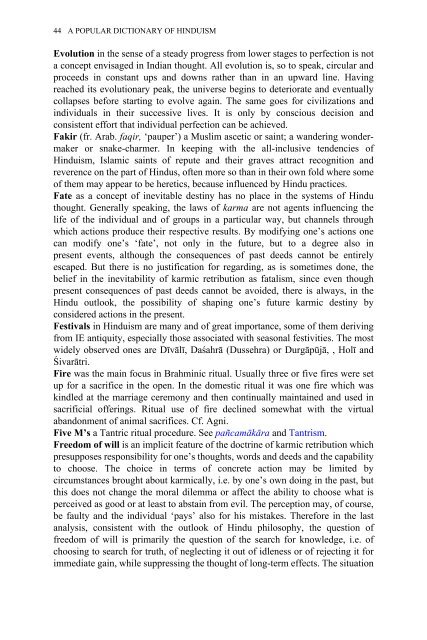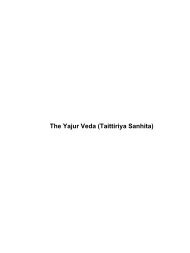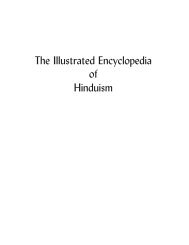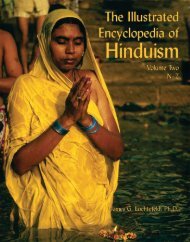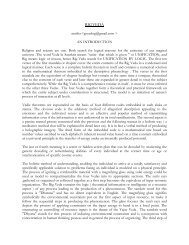You also want an ePaper? Increase the reach of your titles
YUMPU automatically turns print PDFs into web optimized ePapers that Google loves.
44 A POPULAR DICTIONARY OF HINDUISM<br />
Evolution in the sense <strong>of</strong> a steady progress from lower stages to perfection is not<br />
a concept envisaged in Indian thought. All evolution is, so to speak, circular and<br />
proceeds in constant ups and downs rather than in an upward line. Having<br />
reached its evolutionary peak, the universe begins to deteriorate and eventually<br />
collapses before starting to evolve again. The same goes for civilizations and<br />
individuals in their successive lives. It is only by conscious decision and<br />
consistent effort that individual perfection can be achieved.<br />
Fakir (fr. Arab. faqir, ‘pauper’) a Muslim ascetic or saint; a wandering wondermaker<br />
or snake-charmer. In keeping with the all-inclusive tendencies <strong>of</strong><br />
<strong>Hinduism</strong>, Islamic saints <strong>of</strong> repute and their graves attract recognition and<br />
reverence on the part <strong>of</strong> Hindus, <strong>of</strong>ten more so than in their own fold where some<br />
<strong>of</strong> them may appear to be heretics, because influenced by Hindu practices.<br />
Fate as a concept <strong>of</strong> inevitable destiny has no place in the systems <strong>of</strong> Hindu<br />
thought. Generally speaking, the laws <strong>of</strong> karma are not agents influencing the<br />
life <strong>of</strong> the individual and <strong>of</strong> groups in a particular way, but channels through<br />
which actions produce their respective results. By modifying one’s actions one<br />
can modify one’s ‘fate’, not only in the future, but to a degree also in<br />
present events, although the consequences <strong>of</strong> past deeds cannot be entirely<br />
escaped. But there is no justification for regarding, as is sometimes done, the<br />
belief in the inevitability <strong>of</strong> karmic retribution as fatalism, since even though<br />
present consequences <strong>of</strong> past deeds cannot be avoided, there is always, in the<br />
Hindu outlook, the possibility <strong>of</strong> shaping one’s future karmic destiny by<br />
considered actions in the present.<br />
Festivals in <strong>Hinduism</strong> are many and <strong>of</strong> great importance, some <strong>of</strong> them deriving<br />
from IE antiquity, especially those associated with seasonal festivities. The most<br />
widely observed ones are Dīvālī, Daśahrā (Dussehra) or Durgāpūjā, , Holī and<br />
Śivarātri.<br />
Fire was the main focus in Brahminic ritual. Usually three or five fires were set<br />
up for a sacrifice in the open. In the domestic ritual it was one fire which was<br />
kindled at the marriage ceremony and then continually maintained and used in<br />
sacrificial <strong>of</strong>ferings. Ritual use <strong>of</strong> fire declined somewhat with the virtual<br />
abandonment <strong>of</strong> animal sacrifices. Cf. Agni.<br />
Five M’s a Tantric ritual procedure. See pañcamākāra and Tantrism.<br />
Freedom <strong>of</strong> will is an implicit feature <strong>of</strong> the doctrine <strong>of</strong> karmic retribution which<br />
presupposes responsibility for one’s thoughts, words and deeds and the capability<br />
to choose. The choice in terms <strong>of</strong> concrete action may be limited by<br />
circumstances brought about karmically, i.e. by one’s own doing in the past, but<br />
this does not change the moral dilemma or affect the ability to choose what is<br />
perceived as good or at least to abstain from evil. The perception may, <strong>of</strong> course,<br />
be faulty and the individual ‘pays’ also for his mistakes. Therefore in the last<br />
analysis, consistent with the outlook <strong>of</strong> Hindu philosophy, the question <strong>of</strong><br />
freedom <strong>of</strong> will is primarily the question <strong>of</strong> the search for knowledge, i.e. <strong>of</strong><br />
choosing to search for truth, <strong>of</strong> neglecting it out <strong>of</strong> idleness or <strong>of</strong> rejecting it for<br />
immediate gain, while suppressing the thought <strong>of</strong> long-term effects. The situation


